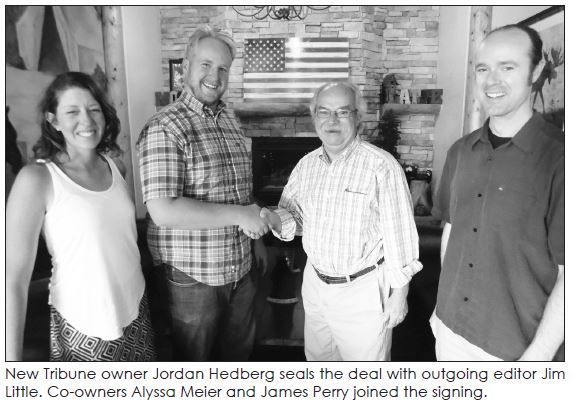(photo from the June 21, 2018, Edition of the Wet Mountain Tribune)
Dropping behind my keyboard to hammer out this editorial for the last edition of the Tribune of 2023, I cannot help but think of the 140 years (or more) and the seven owners of the Tribune before me who took stock of the year, as I am doing right now, behind their typewriters. The news business in a rural community is an odd affair. “Nothing changes, but nothing stays the same” is the verse of one of my songs that I occasionally strum out on a guitar, and on the last week of the year, the steady march of time is obvious.
I came to journalism by accident. My main cash flow back in 2015 was from farmer’s markets in Colorado Springs selling beef for local grassfed beef ranchers. By January of 2016, and the end of the markets, it was clear I needed a job to make it through the winter, a problem workers have always faced in the Valley. My options were an assistant manager job at the newly opened Family Dollar or as a reporter for the Wet Mountain Tribune. To my surprise, I was offered the job at the Tribune.

The diploma that resides in my desk drawer reads, “Bachelor’s of the Liberal Arts.” I did not attend my college graduation, and when I opened the diploma for the first time after it had been sent to me by the United States Postal Service, I was more than a little surprised by what the title said. My major had been history, with a second major in business finance, and this piece of paper, which is sandwiched between two sides of fake red leather, reads “Liberal Arts.” A quick Google search at the time showed it was a degree in the “humanities,” and there was a certain amount of disappointment I carried for a while after the four and half years of work to receive that faux-leather award.
Yet, I had worked for the college newspaper as a sports reporter. Let me be clear, I was the sports reporter because I was second string on the football team as an offensive lineman, and I attended all the home and away games. Plus, the newspaper editor was my next-door neighbor in the dorm. Over the years, I found a way to bang out a twice-monthly series of stories on all the sports teams at Monmouth College. In addition, I was the only member of the unpaid newspaper staff by the end of my college career that had somewhat conservative (I was more libertarian at the time) political leanings in the state of Illinois, which was the home of the new president of the United States, Barack Obama. To this day, I don’t care much about national political parties. Still, at the time, I was tasked by the editor to start writing point-and-counterpoint opinions, taking the conservative side of Illinois and national politics. I had no idea at that time that newspapers were how I would make the majority of my living (we still raise and sell grassfed beef directly to customers for the minority of our living… hint, hint).

My love of history superseded the degree. There was never a question of what I would major in, but there was a question of what I would do with that historical training. They often say in history that journalism is the first draft of history (at least the first draft since the first newsletter was printed in 1609 by Johann Carolus in Strasbourg, which is now part of France). So, I have had the unique opportunity each week to not only take part in the first draft of local history but also to think about how journalism in the modern world works with the needs of the community members in the present time.
It is no secret that the newspaper industry is suffering continuous losses in the age of social media and the internet. However, I think back on the previous owners of the Tribune and the challenges they faced in their time; they were much more severe than the ones we face today. After the mining boom died in 1900, the population of Custer County, Colorado shrank from small to almost nonexistent by 1979. In those 80 years, newspapering was performed not because of the money but because of tradition and love for the community. Through sheer hard work and a (slightly) growing population, the former owner, Jim Little, was able to steer the Tribune into a second golden age of newspapering in the 1990s and the 2000s (the first golden age being the silver boom in the 1880s and 1890s). Sitting here typing out these words as the eighth steward of this community publication, I can look with pride at how we have adapted over the past five years. I also realize that much more hard work remains moving into an uncertain future.
There is a certain type of comfort in the familiarity of many of the stories we publish 52 weeks out of the year: rodeo announcements, the kids in 4-H, four parades per year, the annual quilting shows, and Christmas fairs. All these traditions stretch back into the decades, even a century sometimes, to the point that I can honestly say that the news does not change much, just the names.

But change, even in a world that changes as fast as ours, takes a filter of time to notice. “Hindsight is 20-20” is the old saying, and as a person trained in history, it is shocking to me how long it takes to understand our past with any accuracy, let alone what the future may hold.
So, as we enter a new year, let me press on readers how little we know about our past. In Homer’s The Iliad, there was an oracle named Helenus, who specialized not in the future but in the past. As a member of Troy, he could predict the past with certainty, meaning he could easily understand cause and effect. We are all the products of effects, but understanding the causes that got us here is much more difficult for us to understand without the powers of Helenus. His gift was lost on the people of his time, and I am afraid it is still lost on us some 4000 years later.[i]
The Ancient Greeks believed that history came in cycles. In the modern era, we think we’re on a steady upward progression, perhaps to perfection. Yet, I always ask, “How can we progress if we so easily repeat the mistakes of those before us?” Newspapers sell what is “new.” But the longer I read, observe, and type, the more I realize there is little new under the sun. It is just arranged a bit differently. Worse, it takes a lot of work to look back and study what has happened even in this little Valley, and so few attempt to do so, dooming them to the same mistakes.
I will argue that in this new year, a glance into history might be a better investment than trying to predict or set goals for the future. But there is a fine line; wallowing in the mistakes of the past is a surefire way to suffer in the future. Look to the past as a gold mine of experience, but refrain from the nostalgia or self-loathing that keeps us mired in a time that has passed and will not return.
Here is to Auld Lang Syne, tip a glass to times long past as we eye the bright dawn of the future.
– Jordan Hedberg
[i] It is to Nassim Nicholas Taleb that I owe the story of Helenus. While I had paused on this character when reading the Iliad, it was only years later, reading Taleb’s Fooled by Randomness, that the ancient wisdom in this character was fully flushed out by Taleb.


